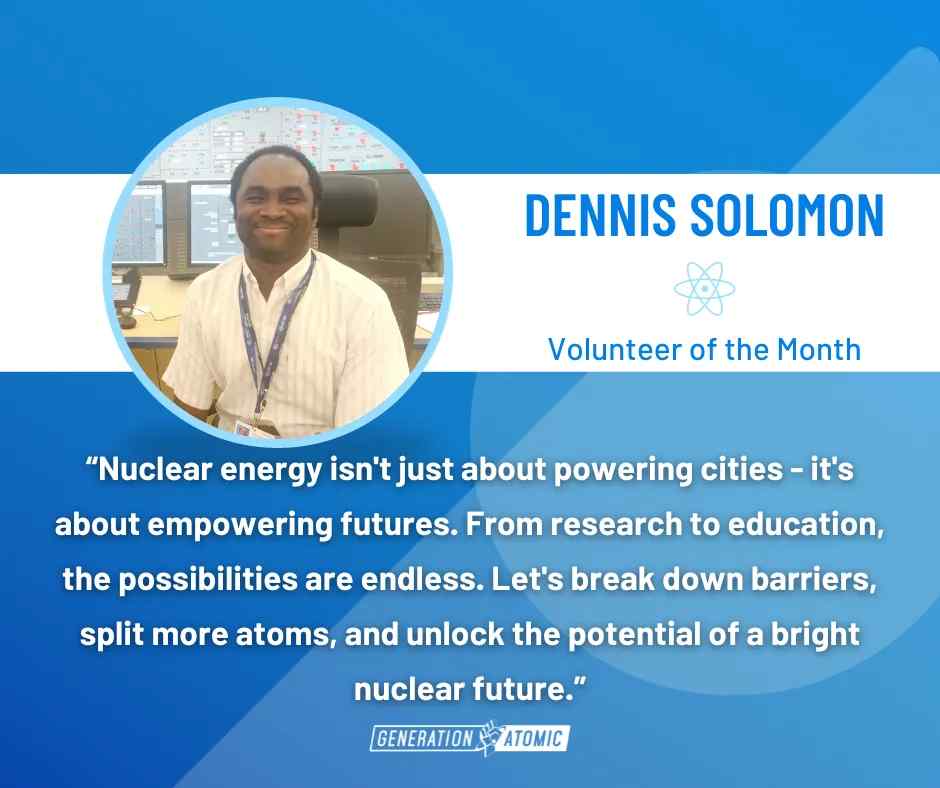Author: Mary Kloser

December’s Volunteer of the Month: Dennis Solomon!
With a plethora of activities from our volunteers this month at COP28, selecting just one person was a challenge. However, Dennis stood out with his exceptional efforts, shining brightly as he delivered the message about nuclear on multiple fronts.
Dennis was sponsored with a COP badge, recognizing his commendable work last year, where he visited 10 schools and engaged with over 1,000 students about nuclear energy.
At COP28, Dennis played a key role in advocacy, assisting at the Nuclear for Climate pavilions and engaging in discussions about nuclear energy with several leaders, including representatives from his home country, Nigeria. A highlight for Dennis at COP28 was his participation as a panelist at the Net Zero Nuclear Pavilion, in an event titled “Ask a Nuclear Engineer.”
We are in deep gratitude to your efforts Dennis!
To learn more about Dennis check out the Q&A below.
Q: When did you first get into nuclear advocacy and why?
A: “My initial engagement with nuclear technology stemmed from pursuing a Master’s degree in Nuclear Physics. As I delved deeper into the field, I became increasingly aware of the challenges surrounding radioactive waste management. This, coupled with my personal dedication to environmental sustainability, ignited a desire to advocate for safer and more responsible nuclear practices. My research on core lifetime estimations and involvement in organizations like Generation Atomic have become platforms for me to contribute to this crucial endeavor. My interest in nuclear advocacy truly began during my research on optimizing reactor core lifetimes, specifically with Low Enriched Uranium (LEU) fuel. Witnessing the significant reduction in radioactive waste generation achievable with LEU fuels sparked a passion within me. Knowing that my research could contribute to safer and more sustainable nuclear energy utilization became a powerful motivator to advocate for wider adoption of LEU and safer practices. My journey into nuclear advocacy started early, even before my postgraduate studies. Organizing the FIRST MAIDUGURI NUCLEAR ADVOCACY TO TEN SCHOOLS in 2022 with funding from Generation Atomic was a pivotal moment. Witnessing the curiosity and enthusiasm of young minds towards nuclear science solidified my belief in the importance of proactive outreach and education. Since then, I’ve actively participated in workshops and conferences, contributing to the conversation on responsible nuclear development and waste management.”
Q: What has been one of your favorite moments while being a nuclear advocate?
A: “Witnessing the eyes of students widen and sparkle with curiosity during the MAIDUGURI NUCLEAR ADVOCACY program I organized in October 2022. Seeing their initial hesitance about nuclear science melt away as they asked insightful questions and we interacted with them. That day, I knew the seeds of responsible nuclear awareness had been planted, and that’s a feeling I’ll never forget. Guiding undergraduate students through their research projects under my supervision is a unique kind of reward. Seeing their initial nervousness transform into focused determination and scientific curiosity as they delve into the world of nuclear physics is both humbling and gratifying. Knowing I’m playing a role in shaping the next generation of nuclear experts who will carry forward the torch of responsible advocacy is a tremendous privilege.”
Q: What hopes do you have for the future of nuclear energy?
A: “A key player in climate change mitigation: Nuclear energy’s ability to generate electricity without greenhouse gas emissions makes it a vital tool in the fight against climate change. Advocates hope that advancements in technology and public acceptance will lead to a significant expansion of nuclear capacity, enabling a cleaner and more sustainable energy future. Increased efficiency and affordability: Advancements in reactor technology, such as small modular reactors (SMRs), could lead to improved fuel efficiency and lower operational costs. This would make nuclear energy more competitive with other sources of electricity, expanding its appeal and accessibility.”
Thank you to Dennis and all our volunteers for their hard work.
Interested in becoming a volunteer? Click here!
Donate to Generation Atomic today by clicking here!


